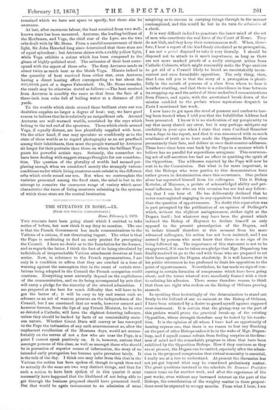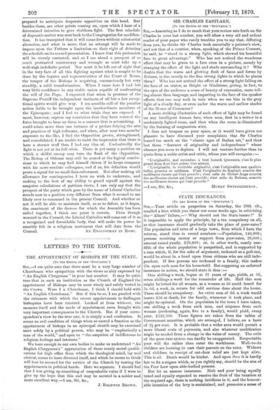THE SITUATION IN ROME.—IX.
[FROM OUR SPECIAL CORRESPONDENT.]
Rome, February 5, 1870. Two rumours have been going about which I omitted to take notice of before, but now think it my duty to mention. The one is that the French Government has made communications to the Vatican of a serious, if not threatening import. The other is that the Pope is meditating to find an early pretext for proroguing the Council. I have no doubt as to the foundation for the former, and as regards the latter, I think the fact of its being circulated by individuals of irreproachable Vatican attachment deserves at least notice. Now, in reference to the French representations, I am only in a condition to affirm that they are couched in a tone of warning against the assumption that in the event of certain reso- lutions being adopted in the Council the French occupation could continue. Everything must naturally depend on the explicitness of the communication, and on its being accompanied by acts that will carry a pledge for the sincerity of the uttered admonition. I am prepared at the best for much difficulty that will have to be got the better of ; it will be easy to try and resent such an advance as an act of wanton pressure on the independence of the Council, but I am convinced that no words, however earnest and however fervent, from the lips of any French Minister, be he ever so devoted a Catholic, will have the slightest deterring influence, unless they should be backed by facts of an unmistakably omin- ous nature. Whether Count Daru will convey or has conveyed to the Pope the intimation of any such announcement as, after the unpleasant recollection of the Mentana days, would act uncom- fortably on the nerves of not a few who are near the Pope, is a point I cannot speak positively on. It is, however, curious that amongst persons of this class, as well as amongst those who should be in possession of superior means of information, the story of an intended early prorogation has become quite prevalent lately. It is the talk of the day. I think one may infer from this that in the Vatican the notion has been spoken of, though to speak thus and to actually do the same are two very distinct things, and that for such a notion to have been spoken of in this quarter it must necessarily have happened that the likelihood of not being able to get through the business proposed should have presented itself. But that would be again tantamount to an admission of some misgiving as to success in carrying things through in the manner contemplated, and this would be but in its turn the admission of a check.
It is very difficult indeed to penetrate the inner mind of the set of men who constitute the real force of the Court of Rome. They do not blab, and they keep their countenances well. When, there- fore, I hear a report of the kind freely circulated as to prorogation, I am not a priori disposed to take it very literally. I should be disposed not to attach to it much importance, as long as there are not more marked proofs of a really stringent action from Catholic Cabinets, which might reasonably make the Pope anxious to get rid of a Council likely to breed an unmistakably incon- venient and even formidable opposition. The only thing, then, that I can tell you is that the story of a prorogation is plenti- fully in the mouth of persons of a class from whom to hear it is rather startling, and that there is a coincidence in time between its cropping-up and the arrival of these undoubted communications from France, and again, with the ascertained break-down of the mission confided to the prelate whose mysterious despatch to Paris I mentioned last week.
I now have to get upon the stool of penance and confess to hav- ing been hoaxed when I told you that the Infallibilist Address had been presented. i knlw it is no vindication of my perspicacity to say that many shared my error, but it may perhaps mitigate my credulity in your eyes when I state that even Cardinal Rauschor was a dupe to the report, and that it was announced with so much semblance of truth as to have made the Opposition Bishops close prematurely their lists, and deliver at once their counter-addresses. These have since been sent back by the Pope in a manner which I believe has no parallel for supercilious arrogance. This overween- ing act of self-assertion has had no effect in quashing the spirit of the Opposition. The addresses rejected by the Pope will now be sent in to the Commission. But what is far more important, is that the Bishops who were parties to this demonstration have rather grown in determination since this occurrence. One prelate alone has separated himself from his colleagues. This is Bishop Ketteler, of Mayence, a prelate of acknowledged ability and per- sonal influence, but who on this occasion has not had any follow- ing that I can hear of. He has deliberately declared that he never contemplated engaging in any opposition that involved more than the question of opportuneness. No doubt this separation was in part prompted by the publication of an opinion of Diillinger's which, without the slightest ambiguousness, strikes right at the Dogma itself ; but whatever may have been the ground which induced the Bishop of Mayeuce to declare himself as only opposed to the present promulgation of the Dogma, and to isolate himself therefore at this moment from his more advanced colleagues, his action has not been imitated, and I am assured by persons who must know that there is no sign of its being followed up. The importance of this statement is not to be exaggerated, if it can be taken as a pledge that Mgr. Dupanloup has finally resolved to go to the end with those who are prepared to set their faces against the Dogma absolutely. It is well known that in his public utterances he has professed to limit his opposition to the point of opportuneness. Nevertheless, he has made no sign of con- curring in certain formulas of compromise which have been going about, and the terms whereof were manifestly framed with a view to enlisting his adhesion. There seems therefore reason to think that those are right who reckon on the Bishop of Orleans proving staunch.
In speaking thus hesitatingly of the determination to stand out firmly to the full end of one so eminent as the Bishop of Orleans, I have been actuated by a. desire to guard myself against supposed over-statement. It is certain that the giving-way ou the part of this prelate would prove the practical break-up of the existing Opposition, whose strength therefore may be tested by his resolu- tion. It is the opinion of all whom I have had an opportunity of hearing express one, that there is no reason to fear any flinching on the part of other Bishops unless it be in the wake of Mgr. Dupan- loup, and I myself cannot refrain from feeling surprise at the firm- ness of mind and the remarkable progress in ideas that have been exhibited by the Opposition Bishops. How if they continue as they are at present, the Dogma can be carried, especially after the admis- sion in the proposed compromise that virtual unanimity is essential, I really am at a loss to understand. At present the discussion has not yet got beyond what may be considered preliminary matter. The great questions involved in the schedule De Romano Pontifice cannot come on for another week, and after the experience of the past weeks, even without any increased interest on the part of the Bishops, the consideration of the weighty matter in these proposi- tions must be expected to occupy months. From what I hear, I am prepared to anticipate desperate opposition on this head. But besides these, are other points coming on, upon which I hear of a determined intention to give stubborn fight. The first schedule of dogmatic matter was sent back to the Congregation for modifica- tion. It has transpired that it will come down without substantial alteration, and what is more, that an attempt will be made to impose upon the Fathers a limitation on their right of debating the schedule on its second presentation. I know that this pretension will be sternly contested, and so I see ahead a prospect of so much protracted controversy and wrangle as must take up a well-nigh indefinite period. Nor must it be left out of sight that in the very face of all this fighting against what is sought to be done by the legates and representatives of the Court of Rome, the temper of the Bishops is acquiring, unconsciously but very steadily, a solid transformation. When I came here I had but very little confidence in any stable union capable of confronting the will of the Pope. I expected that when in presence of the Supreme Pontiff the independent instincts of all but a few excep- tional spirits would give way. I am sensible still of the peculiar action liable to be brought upon the insubordinate members of the Episcopate ; and I feel to what trials they are exposed. I must, however, express my conviction that they have resisted the force brought to bear on them in a manner that is astonishing. I could relate more than one instance of a prelate defying the arts and practices of high influence, and when, after near two months' exposure to the like, I find the Opposition grown, strengthened, and consolidated, I am unable to resist the impression that there is here a sterner stuff than I had any idea of. Undoubtedly the fight is not yet at its fall crisis. There is yet many a position on which a skilful enemy may turn the flank of the Opposition. The Bishop of Orleans may still be scared at the logical conclu- sions to which he may find himself driven if he keeps company with his more resolute colleagues, and if so, his defection would prove a signal for no small dismemberment. But after making all allowance for contingencies I have no wish to underrate, and seeking to the best of my ability to guard myself against the sanguine calculations of partizan views, I can only say that the prospect of the party which goes by the name of Liberal Catholics stands now in a position very different from what it seemed to me likely ever to command in the present Council. And whether or not it will be able to maintain itself, so as to defeat, as it hopes, the enactment of the decrees for which the Assembly has been called together, I think one point is certain. Even though worsted in the Council, the Liberal Catholics will come out of it as a recognized and formidable body, that will make its power be sensibly felt in a religious movement that will date from the



































 Previous page
Previous page